Image
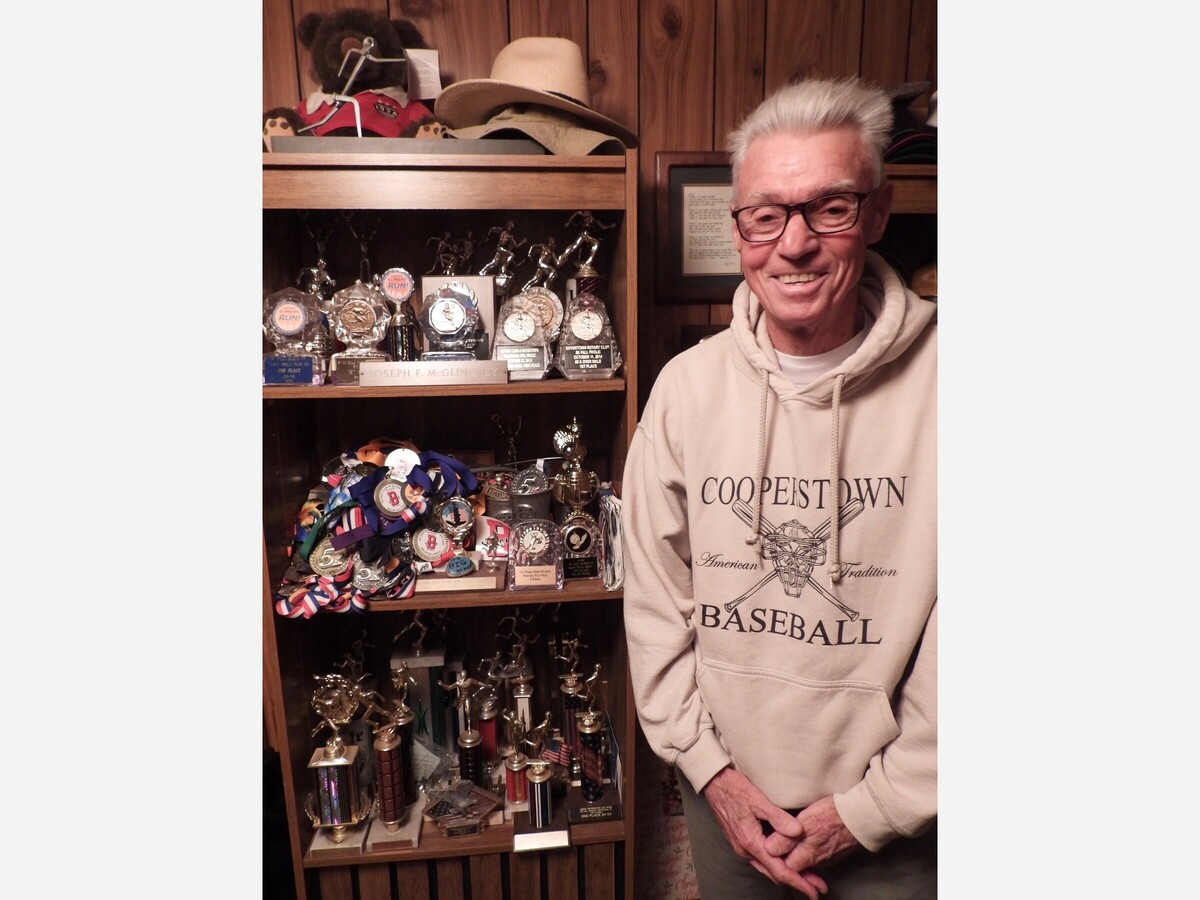
by Mike Strzelecki*
When you first meet Joe McGlinchey, you get the sense that he may be some sort of runner. McGlinchey has the long, slender build of a fit athlete, even at 72 years of age. No paunch, no sags. He maintains youthful posture, honed by a lifetime of worrying about running form. And he’ll probably be wearing beat-up running shoes, enjoying their second life as casual, kick-arounds.
It is not until after you chat with McGlinchey that you realize what a talented and prolific runner he is, and what an indelible mark he has left on the running community of Boyertown and beyond.
McGlinchey recently retired after serving 47 years as a coach at the Boyertown Area Senior High School (BASH). He also spent 39 years as a guidance counselor there. He spent virtually the entire time coaching the long distance runners on the men’s and women’s outdoor track and field teams, and 37 years as the head women’s coach for the indoor track and field team.
I talked to McGlinchey recently about his life and career trajectories. We met at his home on a quiet, leafy street in Gilbertsville, off the beaten track. He reflected on his competitive running career, his serving almost half a century as a coach and mentor to hundreds of young runners, and how his running interfaced with his career as a high school guidance counselor.
McGlinchey explained that running has been a key part of his life dating back to his teen years. He attended Schuylkill Haven High School where he backed into running as a sport. “I couldn’t hit a baseball, so I knew that sport was not in my future,” he said. “And in my freshman year I got cut from the basketball team. I figured that I better get in better shape to play high school basketball, so I started running.”
Running proved to be his true calling. He ended up running track and field for Schuylkill Haven, and also cross country when the school introduced the sport his senior year. As an added benefit, McGlinchey later made the basketball team.
McGlinchey attended Penn State University where he majored in education, and continued running on his own. “I was a mucker and grinder at Penn State,” he smiled. “I was not a scholarship athlete—or one of any note whatsoever. I just ran.”
“Sports don’t develop character, they reveal it. And I have had a lot of athletes over the years that have revealed a ton of character way beyond their athletic ability.”
Following his graduation, McGlinchey found his way to the Boyertown area after a short stint at Mt. Penn High School (now Antietam Middle-Senior High School). He taught English at Boyertown Junior High West for three years but jumped at a chance to coach and serve as a guidance counselor at the senior high, having in the meantime received a master’s degree in guidance counseling from Kutztown University.
The coaching aspect of his professional experience resonated strongly with McGlinchey. “I loved to run, and coaching the track and field team really gave purpose to my life,” he said. McGlinchey initially coached the long-jumpers and triple-jumpers, but soon shifted to coaching the distance runners. This switch occurred at about the same time competitive distance running became a much more vital element in his personal life.
McGlinchey began competing in races ranging from 10Ks (6.2 miles) to full 26.2-mile marathons. He developed into a runner of supreme talent, placing high in the most competitive of races and winning outright some smaller local races. He ran as a member of the Reading Road Runners team.
McGlinchey enjoyed the half marathon distance (13.1 miles) the best, but like so many other runners of that era, got caught up in the slipstream of marathon runners. “I was always a reluctant marathoner,” he said. “But back when I was running more competitively, if you didn’t run a marathon, you were not considered a true runner.”
McGlinchey ended up competing in 15 marathons, taking him up and down the east coast. He ran several marathons in Philadelphia, exploring hidden neighborhoods and parks. He ran the Harrisburg Marathon along the banks of the Susquehanna River and through the streets of the state capitol. He competed in the Skylon Marathon in upstate New York, which takes runners on the Peace Highway from Buffalo to a misty finish at Niagara Falls. McGlinchey’s Reading Road Runners team won the team championship for that meet.
His favorite race, however, is the Boston Marathon. It was on this course in 1981 that McGlinchey set his personal record, covering the distance in a jaw-dropping 2:35:34. What makes the Boston Marathon so special is that not just anyone can enter; you have to qualify for the race by running another marathon under a specific-- and very challenging--time based on your age and gender. McGlinchey ultimately participated in four Boston Marathons.
“Running Boston is a thrill for runners,” he explained. “It is so iconic. It is so steeped in traditions and has such an aura surrounding it. The course is truly historic. The excitement of coming through Wellesley College with all the girls out cheering for you. The thrill of running up Heartbreak Hill, coming to the crest, and seeing the Citgo sign in downtown Boston, which is near the finish, even though it is still six miles away. You cannot fully appreciate the Boston Marathon until you are running it.”
McGlinchey’s extensive running experience made him a seasoned, knowledgeable, insightful, and hands-on coach. “Distance runners run distance” is his coaching mantra. Although he did not necessarily believe in mega-miles like some peer coaches, he was a firm believer that you have to run enough miles to establish a strong, solid endurance base. No short-cuts.
McGlinchey explained that his philosophy is to approach each athlete as a potential runner, and he was quick to offer lots of personal attention. “I nurtured and encouraged every kid on the team,” he explained. “I told my runners: if I stop getting on you, then you should be concerned. But if you are a 7-minute miler and I can make you a 6:30 miler, I will work on that. If you are a 5:30 miler and I can make you a 5-minute miler, I will work with you.”
“I would never write an athlete off,” he explained. “All have potential. Kids of all abilities on my team achieve and succeed, not just the podium runners.”
McGlinchey admits that one reason for his teams’ successes over the years has been his knack for making running fun. “We did not go out and hammer tough miles every day,” he said. “We would spice it up with running games. Duck duck goose, scavenger hunt runs, games where I roll dice to determine our workouts, or pull from a deck of cards.”
“It keeps the team engaged. You had to have something that made it fun.”
McGlincheyisms are pithy statements he often expressed repeatedly to his teams for learning and motivation. He had dozens. One of his favorites is “nothing works like work.” In other words, if you put in the work, you will get better.
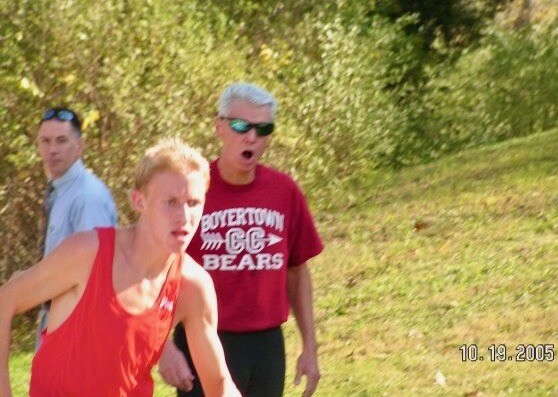
I asked McGlinchey to share a few runners he has coached over the past 47 years who have excelled at an unusually high level. He did not have to reach deep into his memory bank, as the names quickly rolled off his tongue. Here are a few.
Creighton Rothenberger, from the early 1980s: “He was my first real blue-chip runner. He was a state qualifier and a state medalist three years in a row. I still remember him winning districts as a sophomore with a withering kick. Such a natural talent and a smart kid.” Rothenberger went on to run at the University of Pennsylvania and today is a screenwriter in Hollywood. His movies include Olympus Has Fallen, London Has Fallen, and the Expendables 3.
Bobby Ilik, from the mid- to late-1980s: “He was a state qualifier in both the 1,600 meters and 3,200 meters, and just a really gritty runner and hard worker. He was super responsive to coaching. He ran at LaSalle University and ended up being a IC4A champion in the 800 meters. He was a real talent, a pretty runner to watch, especially when he was in full stride.”
Cameron Troxel, from the early 1990s: “He qualified for the states in the 3,200 meters and also qualified for the Penn Relays in the 3,000 meters.”
Kristie Moser, from the early 1990s: “She was simply one of the best runners I have ever coached, boy or girl. As a sophomore, she was just one of the girls, but by the time she was a senior, she was one of the best runners in the state. She was invited to run in the Millrose Games in New York City, which is a premier national meet. She was also a two-time qualifier in the indoor nationals in the 3,000 meters. She went on to run at Penn State and I still see her running in local road races.”
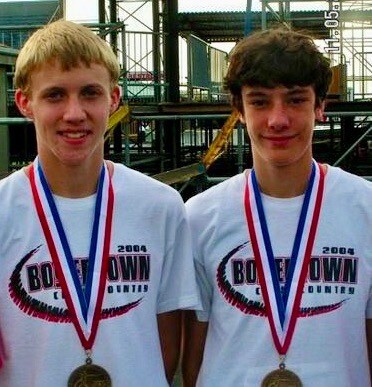
Jason Weller and Mark Dennin, from the late 2000s: “These were back-to-back state champions in both the 3,200 meters and in cross country. Weller was also a state champion in the 3,000 meters in indoor track and won that event at the Penn Relays. He also won the Millrose Games mile. He ended up running at Iona University and was inducted into the Pennsylvania Track and Field Hall of Fame. Mark Dennin ran in his shadow for a while but emerged after Weller graduated and became a state cross country champion as well. He also won the 3,200 meter run at the Penn Relays. He ran for Georgetown University after graduating from BASH.”
Alex Heuer, from the early 2010s: “She was a two-time indoor nationals qualifier in the triple jump and certainly the most talented non-runner that I have ever coached.”
Dylan Eddinger, from the late 2010s: “He was a state medalist in the 800-meters event and went on to have a fine running career at St. Joseph’s University."
“I would never write an athlete off. All have potential. Kids of all abilities on my team achieve and succeed, not just the podium runners.” – Joe McGlinchey
The highest-achieving runners are not the only ones that McGlinchey remembers. He told the story of Austin Holiday, who joined the team as a back-of-the-pack runner. “We affectionately called him Sasquatch because of his running style,” he laughed. “But he worked his tail off and he ended up being the number two runner on the team by his senior year.”
“One day, out of the blue, I got a call from Austin, and he told me that he was entering the Air Force and he thanked me for getting him in shape for his new service.” These are the moments that touch a coach’s heart the deepest.
I asked McGlinchey what sets these kids apart from the numerous other talented distance runners that have passed through the halls of Boyertown High School over the decades. “First, they are all very coachable,” he explained. “And second, while they all have natural talent, these are the ones that have that special instinct. They know the difference between 'come here' and 'sic 'em.'
“Sports don’t develop character, they reveal it,” he continued. “And I have had a lot of athletes over the years that have revealed a ton of character way beyond their athletic ability.”
McGlinchey discussed his guidance counseling career and the similarities between being a coach and a counselor. He delineated the various issues that high school guidance counselors typically confront, like disjointed families, academics, home problems, mental health issues, stress. He explained that both counseling and coaching require an enormous level of empathy and a tremendous amount of flexibility to address the various issues encountered.
“As a counselor, every kid brought a different set of circumstances to the counseling session,” he remarked. “I had to respect that, I had to respect the uniqueness of each kid.” McGlinchey explained that there is not a one-size-fits-all solution to the problems and challenges that high school students encounter. Each individual student is his or her own case study.
From his guidance counseling experience, McGlinchey had a unique glimpse into what issues his runners were dealing with outside of the sport. And likewise, he learned that each runner required individual attention.
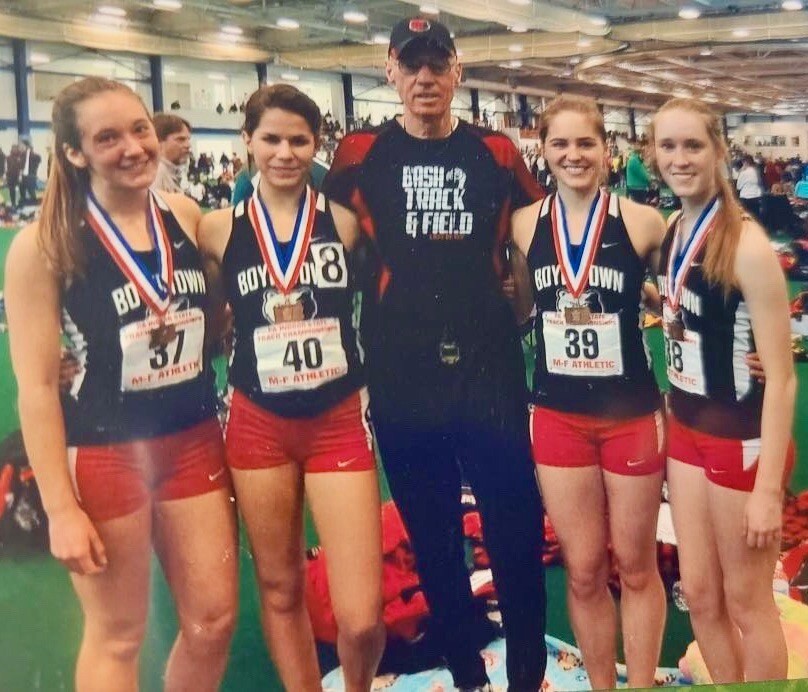
“Kids come to practice with many other things going on in their world,” he said. “And running may not be the most important thing to them on that day. Or in their lives. It is important to me. But I had to understand that these kids are dealing with many issues at that stage in their lives. As a result, I had to be a good listener and be empathetic to what those kids brought to me every day.”
“You do that as a counselor and you do that as a coach,” he added. You listen to each kid individually and you reflect. I also saw the track as being a sanctuary for them—a place they could come and feel safe and feel like they had something to contribute.”
McGlinchey admitted that when he laced up his first pair of running shoes when he was 14, he had no idea that the road he headed down that day would be never-ending. “I would never have envisioned that I would still be running at 72 and for the rest of my life,” he beamed.
McGlinchey still hits the pavement four or five times a week for runs and can be seen plying the streets of his neighborhood, through town, or on local bike trails. On off days, he works out on the elliptical trainer or other exercise apparatus.
“I just love to sweat,” he remarked. “I love just doing a good workout every day. And as [football coach] Herm Edwards said, ‘no one ever drowned in their own sweat.’”
“I’ll run into guys who will ask me if I am still running,” he added. “I will say to them, ‘Are you still bowling, are you still fishing, are you still golfing?’
McGlinchey has competed in over 300 races over the course of his running career. He still jumps in local 5K running races. “If I enter a 70-year age group, all I have to do is beat a couple of other guys with gray hair and bad backs and I get a medal,” he chuckled. “I may be squeezing cheeks to break 27 minutes these days, but I am still getting it done.”
“I’ll run into guys who will ask me if I am still running,” he added. “I will say to them, ‘Are you still bowling, are you still fishing, are you still golfing?’ It‘s what I do, it’s my sport, my pastime. I find it cathartic, I enjoy moving. Sometimes during runs, I will just smile because, hey, how many 72-year-olds can do this?”
“I have gotten so much more from running than I ever gave to it - and I gave a lot. It has enriched my life in an unbelievable way. It is the fabric of my life.”
McGlinchey cited William Glasser, an author and psychiatrist who studies the concept of positive addictions. I asked McGlinchey if he considered himself a compulsive runner. “Oh yes!” he exclaimed without pause. “It’s my positive addiction; I am positively addicted to running.”
As our chat wound down, McGlinchey offered a tour of his running room. We descended stairs to his finished basement, passed through a large, comfortable sitting room with a low ceiling and walls slung heavy with Penn State memorabilia. We then passed by another room that glowed red with Philadelphia Phillies paraphernalia.
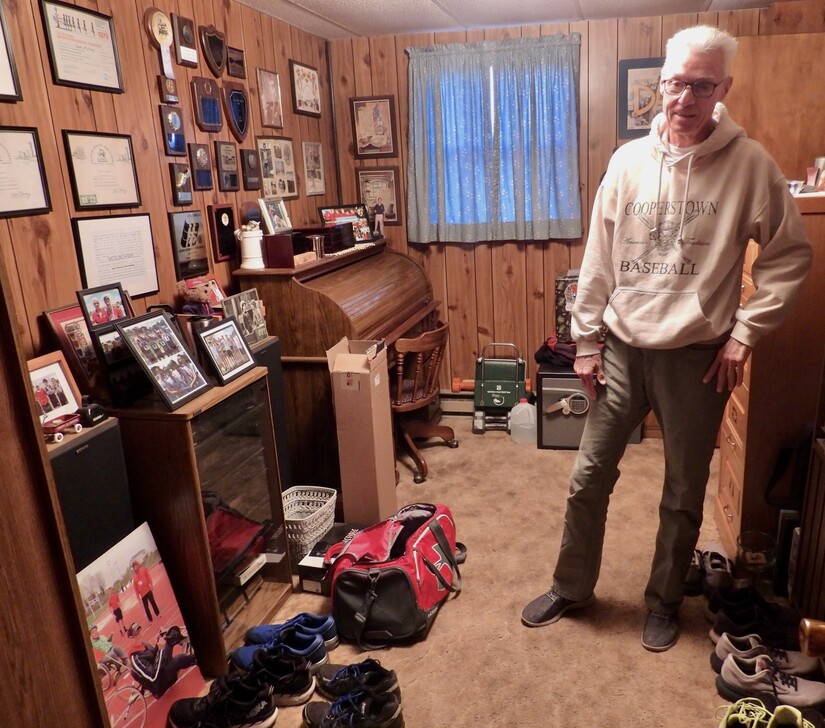
McGlinchey’s running room is the size of a small bedroom. One side is shelves crammed full of his many trophies and race medals. He has stacks of running magazines from decades past, race bibs, and race programs. Walls are covered with an array of pictures of McGlinchey running (often sporting his trademark mustache, a seemingly de rigeur feature of competitive runners in the 1970s and 80s), coaching, and hanging out with his track friends. In one picture, he is photobombing Bill Rodgers, perhaps the greatest marathoner of that generation. There is an open closet thick with his favorite running shirts, warm-up suits, and t-shirts given to him by his various teams as a thank you for his coaching.
What is not captured in his running room, however, are perhaps the things that runners value moss—the memories, the friendships, the health benefits. There are not many runners that engage in their sport solely for hardwear.
For all that McGlinchey has given to the running community these past 50 years, this past February, it gave back to him at an unfathomable level. McGlinchey and his wife, Diane, lost their oldest daughter, AmyJo. She passed away in February. She was 51.
“If I couldn’t have run and coached this past year, I don't know how I would have gotten through this,” he explained, the pain fresh in his voice. “It was totally unexpected and just took the wind out of our sails. It was devastating. But because I could run, I would go out for some miles just to have something to do, to expel energy. And because I had kids to coach, I had something to do every day that spring.”
Before ending our chat, McGlinchey touched on friendships he has made through his running channels. He talked about running friends he has kept in touch with over the decades. He discussed at length the relationships he formed with parents of kids he coached, and how some have turned into lifetime friendships.
I asked him to share one thing that he did not think parents knew about him as a coach. He ruminated a bit, and then offered, “Some parents knew this, but I don’t think all did. I loved their kids. I loved them in a different way than they did. But nonetheless, I loved every kid I coached.”
[*Mike Strzelecki is a 1981 graduate of Boyertown Area Senior High and a freelance travel and outdoors writer. He writes from his home in Baltimore, Maryland.]